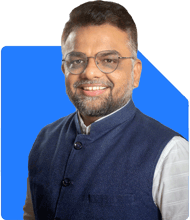Ramalingam Kalirajan |10872 Answers |Ask -Follow
Mutual Funds, Financial Planning Expert - Answered on May 26, 2024
He has an MBA in finance from the University of Madras and is a certified financial planner.
He is the director and chief financial planner at Holistic Investment, a Chennai-based firm that offers financial planning and wealth management advice.... more

Is mutual fund market volatile and on verge of collapse just as in harshad mehta time
Understanding Market Volatility
1. Nature of Market Volatility
Market volatility refers to the fluctuations in market prices over a short period. It’s a natural part of investing and can be influenced by various factors such as economic data, geopolitical events, and investor sentiment.
2. Current Market Conditions
The mutual fund market, like any other financial market, experiences ups and downs. Recent times have seen fluctuations due to factors like global economic changes, interest rate adjustments, and pandemic-related disruptions.
Comparing with Harshad Mehta Era
1. The Harshad Mehta Scam
The Harshad Mehta scam of the early 1990s involved fraudulent manipulation of stock prices using bank funds. It led to a market crash and significant financial losses for many investors.
2. Differences in Market Regulation
Since the Harshad Mehta era, market regulations have significantly improved. The Securities and Exchange Board of India (SEBI) has implemented stringent measures to prevent such frauds. This has increased market transparency and investor protection.
Evaluating Mutual Fund Stability
1. Diversification of Mutual Funds
Mutual funds invest in a diversified portfolio of assets, spreading risk across various securities. This diversification helps in mitigating the impact of market volatility on your investments.
2. Professional Management
Mutual funds are managed by professional fund managers who actively monitor and adjust the portfolio to optimize returns and manage risk. Their expertise helps in navigating market fluctuations.
Current Market Outlook
1. Economic Indicators
Current economic indicators such as GDP growth, inflation rates, and corporate earnings suggest a mixed outlook. While some sectors show growth potential, others may face challenges.
2. Global Influences
Global economic conditions, including trade policies and geopolitical tensions, can influence the market. Investors should stay informed about these factors as they impact market stability.
Investment Strategies in Volatile Markets
1. Long-Term Perspective
Adopting a long-term investment perspective helps in weathering short-term market volatility. Historically, markets have shown a tendency to recover and grow over the long term.
2. Asset Allocation
Diversifying your investments across different asset classes such as equities, debt, and gold can balance risk and returns. This strategy reduces the impact of volatility on your overall portfolio.
3. Regular Review and Rebalancing
Regularly reviewing and rebalancing your portfolio ensures it remains aligned with your financial goals and risk tolerance. Adjusting your asset allocation based on market conditions can optimize returns.
Importance of Consulting a Certified Financial Planner
1. Personalized Advice
A Certified Financial Planner (CFP) provides personalized advice based on your financial situation, goals, and risk tolerance. They help you make informed decisions tailored to your needs.
2. Expert Management
A CFP continuously monitors your investments and market conditions. They make necessary adjustments to your portfolio, ensuring it remains on track to achieve your financial objectives.
3. Risk Management
A CFP employs strategies to manage risk and optimize returns. Their expertise helps in navigating market volatility and safeguarding your investments.
Final Thoughts
While the mutual fund market, like any financial market, experiences volatility, it is not on the verge of collapse like during the Harshad Mehta era. Improved regulations, professional management, and diversified portfolios contribute to its stability.
Adopting a long-term investment perspective, diversifying your portfolio, and consulting a Certified Financial Planner can help you navigate market fluctuations and achieve your financial goals. Your proactive approach to managing your investments is commendable.
Best Regards,
K. Ramalingam, MBA, CFP
Chief Financial Planner,
www.holisticinvestment.in
You may like to see similar questions and answers below
Vivek Shah | Answer |Ask -Follow
Financial Planner - Answered on Feb 13, 2023
Ulhas Joshi |280 Answers |Ask -Follow
Mutual Fund Expert - Answered on Jul 18, 2023
Milind Vadjikar | Answer |Ask -Follow
Insurance, Stocks, MF, PF Expert - Answered on Jan 24, 2025
Ramalingam Kalirajan |10872 Answers |Ask -Follow
Mutual Funds, Financial Planning Expert - Answered on Mar 24, 2025
Radheshyam Zanwar |6735 Answers |Ask -Follow
MHT-CET, IIT-JEE, NEET-UG Expert - Answered on Dec 06, 2025
Dr Nagarajan J S K |2576 Answers |Ask -Follow
NEET, Medical, Pharmacy Careers - Answered on Dec 06, 2025
Mihir Tanna |1090 Answers |Ask -Follow
Tax Expert - Answered on Dec 06, 2025
Ramalingam Kalirajan |10872 Answers |Ask -Follow
Mutual Funds, Financial Planning Expert - Answered on Dec 06, 2025
Radheshyam Zanwar |6735 Answers |Ask -Follow
MHT-CET, IIT-JEE, NEET-UG Expert - Answered on Dec 06, 2025
Radheshyam Zanwar |6735 Answers |Ask -Follow
MHT-CET, IIT-JEE, NEET-UG Expert - Answered on Dec 06, 2025
Radheshyam Zanwar |6735 Answers |Ask -Follow
MHT-CET, IIT-JEE, NEET-UG Expert - Answered on Dec 06, 2025
Dr Dipankar Dutta |1837 Answers |Ask -Follow
Tech Careers and Skill Development Expert - Answered on Dec 05, 2025
Dr Shyam Jamalabad |108 Answers |Ask -Follow
Dentist - Answered on Dec 05, 2025
Dr Shyam Jamalabad |108 Answers |Ask -Follow
Dentist - Answered on Dec 05, 2025




























